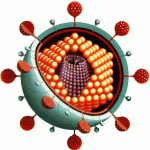Virology
|
2 july 2015 12:46:29 |
| Vaginal colonisation by probiotic lactobacilli and clinical outcome in women conventionally treated for bacterial vaginosis and yeast infection (Epidemiologic Perspectives & Innovations) |
|
Tweet Background:
The aim of this study was to investigate the colonisation by lactobacilli and clinical outcome in women with bacterial vaginosis (BV) and recurrent vulvovaginal candidiasis (R-VVC) receiving antibiotic or anti-fungal treatment in combination with the probiotic EcoVag® capsules.
Methods:
A total of 40 Scandinavian women diagnosed with BV or VVC on the basis of Amsel’s criteria or clinical symptoms were consecutively recruited in two pilot open label clinical trials. In trial I, women with BV were treated with clindamycin and metronidazole followed by vaginal EcoVag® capsules, containing Lactobacillus rhamnosus DSM 14870 and Lactobacillus gasseri DSM 14869, for 5 consecutive days after each antibiotic treatment. In trial II, women were recruited in three groups as follows: women with BV receiving clindamycin and metronidazole treatment together with a prolonged administration of EcoVag® (10 consecutive days after each antibiotic treatment followed by weekly administration of capsules for next four months), women with R-VVC receiving extended fluconazole and EcoVag® treatment, and women receiving extended fluconazole treatments only. The difference in frequency of isolation of EcoVag® strains or other lactobacilli between groups was compared by Fisher’s exact test.
Results:
The 6-month cure rate for BV was 50 % in trial I while both the 6- and 12-month cure rates were 67 % in trial II. The 6- and 12-month cure rates for VVC were 100 % and 89 % in women receiving fluconazole and EcoVag®, and 100 % and 70 % in women receiving fluconazole only. The frequency of isolation of any Lactobacillus species during the course of the study was associated with cure of BV in trial I and II, whereas the frequency of isolation of EcoVag® strains was significantly associated with the cure of BV in trial II only. As previously observed, a change in sexual partner was associated with relapse of BV with an Odds ratio of 77 (95 % CI: 2.665 to 2225).
Conclusions:
The study suggests that the treatment with antibiotics or anti-fungal medication in combination with EcoVag® capsules provide long-term cure against BV and R-VVC as compared to previous reports.Trial registrationClinicalTrials.gov NCT02295579. Registered November 20, 2014 |
| 134 viewsCategory: Pathology, Virology |
 Unmet clinical needs in chronic migraine: Rationale for study and design of COMPEL, an open-label, multicenter study of the long-term efficacy, safety, and tolerability of onabotulinumtoxinA for headache prophylaxis in adults with chronic migraine (Epidemiologic Perspectives & Innovations) Unmet clinical needs in chronic migraine: Rationale for study and design of COMPEL, an open-label, multicenter study of the long-term efficacy, safety, and tolerability of onabotulinumtoxinA for headache prophylaxis in adults with chronic migraine (Epidemiologic Perspectives & Innovations)Evaluation of phytochemical content, antimicrobial, cytotoxic and antitumor activities of extract from Rumex hastatus D. Don roots (Epidemiologic Perspectives & Innovations) 
|
| blog comments powered by Disqus |
MyJournals.org
The latest issues of all your favorite science journals on one page
The latest issues of all your favorite science journals on one page



